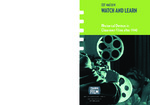Watch and Learn
Rhetorical Devices in Classroom Films after 1940
| dc.contributor.author | Masson, Eef | |
| dc.date.accessioned | 2013-12-31 23:55:55 | |
| dc.date.accessioned | 2019-12-10 14:46:32 | |
| dc.date.accessioned | 2020-04-01T15:08:14Z | |
| dc.date.available | 2020-04-01T15:08:14Z | |
| dc.date.issued | 2012 | |
| dc.identifier | 439100 | |
| dc.identifier | OCN: 868631030 | en_US |
| dc.identifier.uri | http://library.oapen.org/handle/20.500.12657/34268 | |
| dc.description.abstract | Since the late 1990s, there has been a marked increase in academic interest in what are sometimes called 'utility films', intended for purposes of information, training, teaching or advertising. Although such research was long overdue, the current academic output tends to be restricted in scope, paying little attention to the films' textual features: the means they deploy in defending their informational, educational or commercial arguments. In the absence of such studies, the image survives of very 'formulaic' genres. This book seeks to modify this picture, and suggests a methodology that helps to foreground the films' rhetorical diversity. Taking her departure from a historic collection of Dutch classroom films, Masson proposes an approach that considers an audio-visual text as part of a so-called dispositif: the set-up of technology, text and viewing situation that is relevant to the specific corpus under scrutiny. | |
| dc.language | English | |
| dc.relation.ispartofseries | Framing Film | |
| dc.subject.classification | thema EDItEUR::A The Arts::AT Performing arts::ATF Films, cinema | en_US |
| dc.subject.classification | thema EDItEUR::A The Arts::AT Performing arts::ATJ Television | en_US |
| dc.subject.other | motion pictures | |
| dc.subject.other | film | |
| dc.subject.other | Didacticism | |
| dc.subject.other | Netherlands | |
| dc.subject.other | Pedagogy | |
| dc.subject.other | Rhetoric | |
| dc.title | Watch and Learn | |
| dc.title.alternative | Rhetorical Devices in Classroom Films after 1940 | |
| dc.type | book | |
| oapen.abstract.otherlanguage | Sinds de late jaren negentig is er een toenemende academische belangstelling voor zogenoemde 'gebruiksfilms': films die bedoeld zijn om te informeren, te trainen of onderwijzen, of te overtuigen van het nut van een service of product. Onderzoek richtte zich tot nu toe vooral op de productie- of distributiegeschiedenis van dergelijke films, of hun pedagogische effectiviteit. Minder aandacht is er voor hun tekstuele dimensie: de middelen die ze inzetten ter onderbouwing van hun informatieve, educatieve of commerciële argument. Intussen hebben gebruiksfilms echter nog steeds het imago van erg 'formulaire' genres. Eef Masson nuanceert dit beeld in haar boek, en stelt een methodologie voor die de aandacht vestigt op de retorische diversiteit van deze films. | |
| oapen.identifier.doi | 10.26530/OAPEN_439100 | |
| oapen.relation.isPublishedBy | dd3d1a33-0ac2-4cfe-a101-355ae1bd857a | |
| oapen.series.number | 2 | |
| oapen.pages | 372 | |
| oapen.remark.public | Relevant Wikipedia pages: Didacticism - https://en.wikipedia.org/wiki/Didacticism; Netherlands - https://en.wikipedia.org/wiki/Netherlands; Pedagogy - https://en.wikipedia.org/wiki/Pedagogy; Rhetoric - https://en.wikipedia.org/wiki/Rhetoric |

